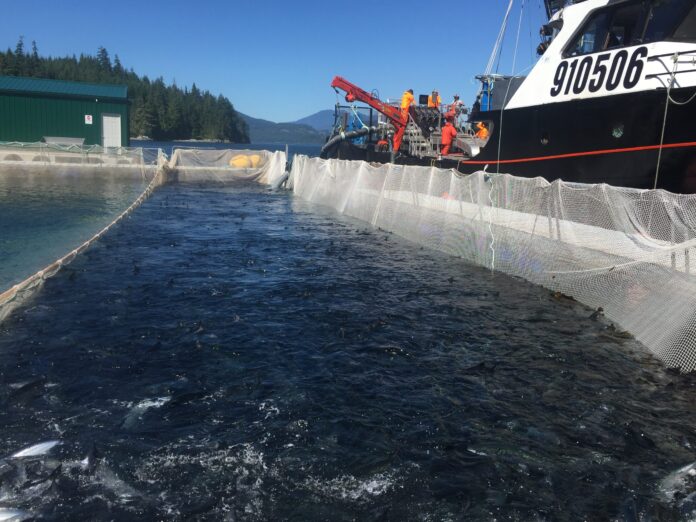A coalition of First Nations has applied to intervene in an ongoing court case about salmon farms in the Discovery Islands.
Two coastal First Nations have joined forces with Fraser River nations and the Union of BC Indian Chiefs (UBCIC) to seek intervenor status in a case launched this spring by Mowi Canada West. The coalition includes UBCIC, the Kwikwasut’inuxw Haxwa’mis First Nation, ‘Namgis First Nation, St’át’imc Chiefs Council, Stó꞉lō Tribal Council, and Musqueam Indian Band.
The salmon farming giant, backed by other companies as well as the We Wai Kai and We Wai Kum First Nations, wants the court to overturn former Fisheries Minister Joyce Murray’s decision to not renew licences for Discovery Islands farms. The company says her decision was “unreasonable, invalid and unlawful.”
The We Wai Kai and We Wai Kum First Nations, located in Campbell River and on Quadra Island, say they were not properly consulted by the Fisheries and Oceans ministry before Joyce announced her decision.
The First Nations coalition supports the decision, and in a statement published by the UBCIC say it supports their “inherent title, rights and responsibilities to wild salmon and wild salmon habitat.”
The coalition praised the former minister for taking a precautionary approach in the context of scientific uncertainty. They also say the decision respects their rights and responsibilities.
“KHFN relies heavily on Fraser River-bound sockeye salmon as they pass through the Johnstone Strait. As a Hereditary Chief, I have a responsibility to steward our lands, waters and resources according to our strict Indigenous law and governance practices,” says hereditary and elected Chief Rick Johnson of the Kwikwasut’inuxw Haxwa’mis First Nation. “KHFN does not consent to the continuation of any open net-pen fish farms in our territory or along the migration routes of any of the wild salmon species that travel through or return to our territory. This is because the health and survival of migrating wild salmon depends on removing and reducing threats and stressors they face along their entire migratory routes.”
BC salmon farming companies have already shut down sites in the Broughton Archipelago region, nearly halving annual production by the entire industry.






